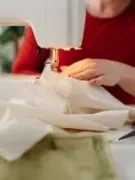
One of my leisure occupations is sewing. When I learned this weekend (3/21/20) that some U.S. hospitals and medical facilities have reached out to the sewing community at large to ask sewers to make fabric surgical face masks, I was on board.
As an occupational therapist, I know that stress management includes doing something you believe is an active step forward in the problem you are trying to solve. With shortages of personal protective equipment (PPE) both domestically and internationally, I felt this would be an excellent time to volunteer some fabric and some hours to reducing the shortage. Using my hands in a favorite occupation helped me focus my energy on solutions instead of worry.
Additionally, I enlisted the help of the staff at my Chicago-Wicker Park clinic to speed the production of these masks. Having a streamlined production line will hasten the delivery of masks to staff and patients in our clinic and bring occupation to others as we share in the process of making a product.
There has been controversy over the use of cotton face masks, but as this pandemic worsens and PPE supplies dwindle, guidelines are changing. In Chicago, the director of the Illinois Department of Public Health was reported to say that there is "no doubt" a mask is better than no mask to prevent spreading the virus. This should not embolden us to think masks protect us. Social isolation is still the first-line defense, and N95 masks should most definitely go to those most at risk in hospital settings. The CDC has updated its standards to include homemade masks when no other option is available.
I have always been grateful that I chose the profession of occupational therapy. Today, during a national pandemic, I am thankful my chosen profession has taught me the value of occupation, engagement and participation in solving problems and managing stress.
CDC update
Homemade masks basics

